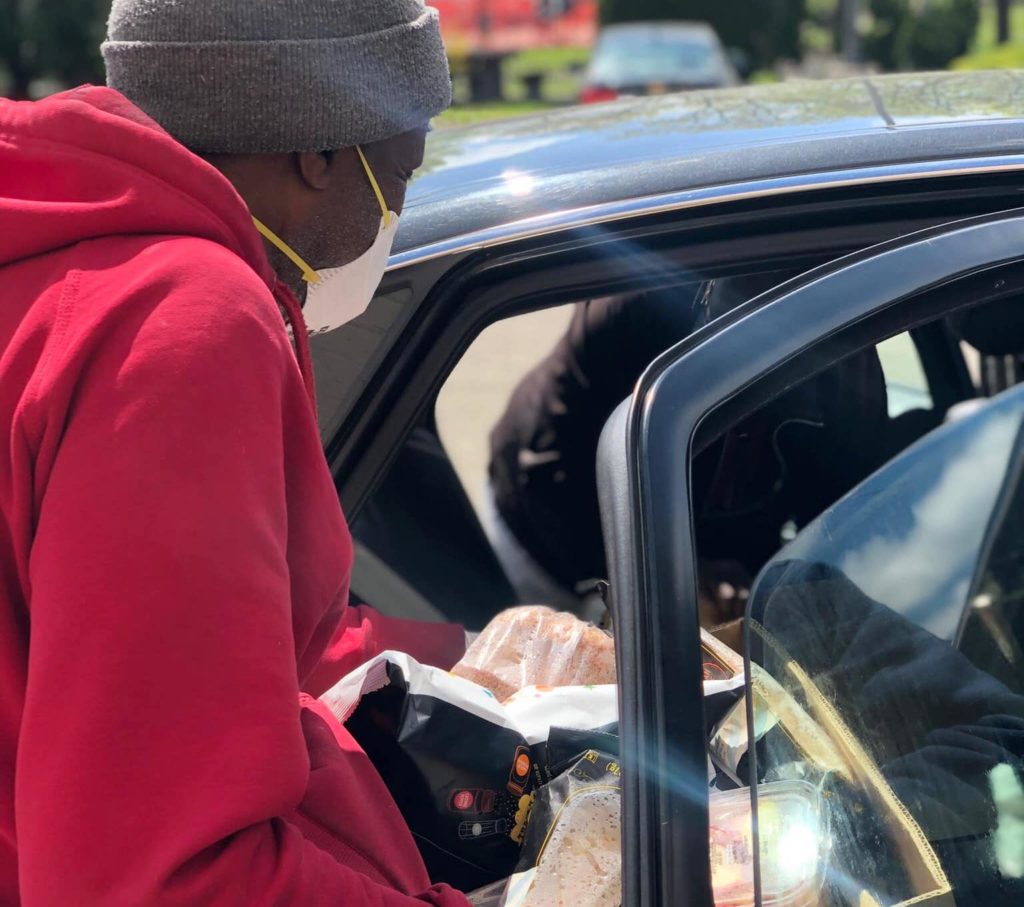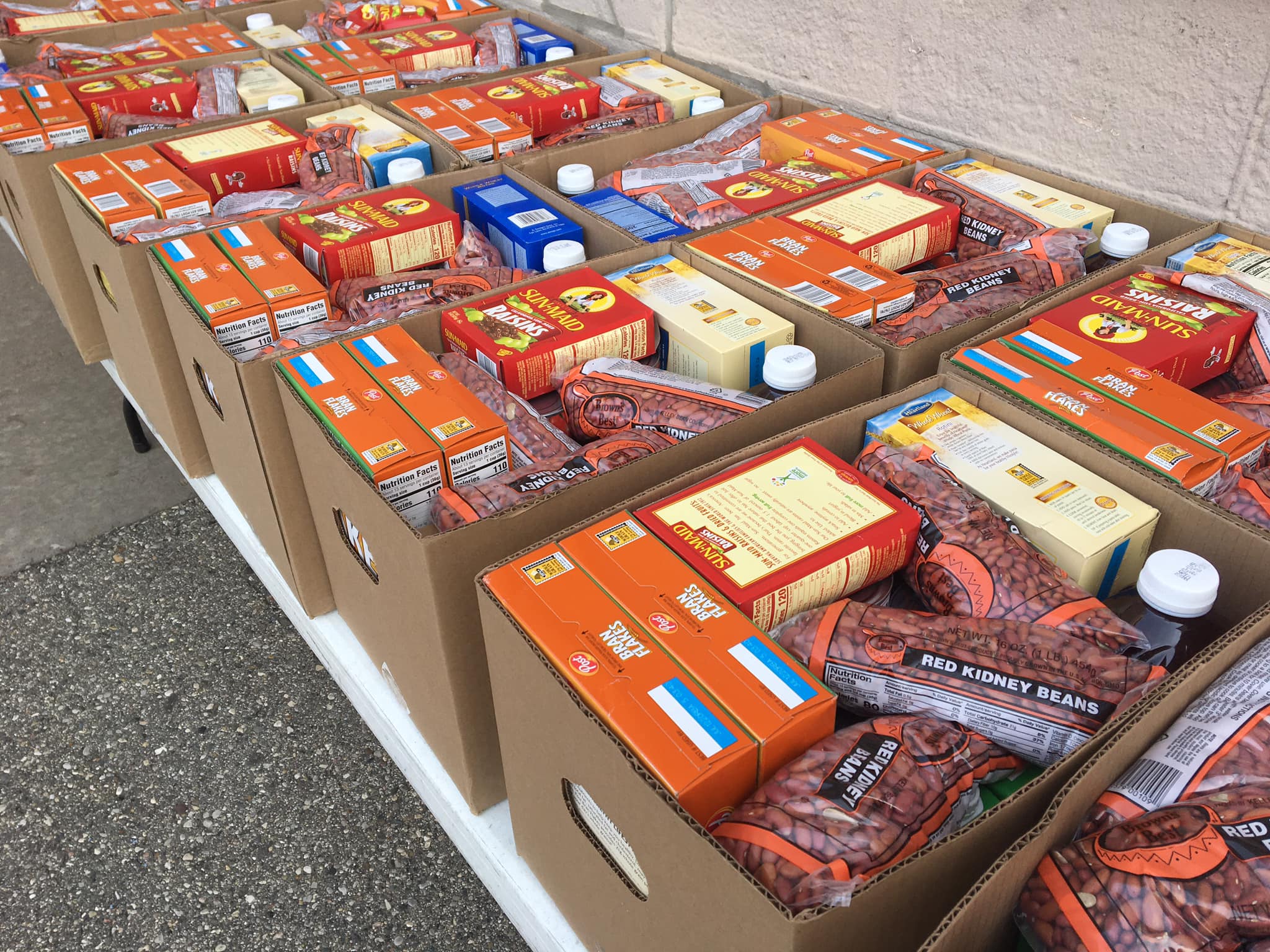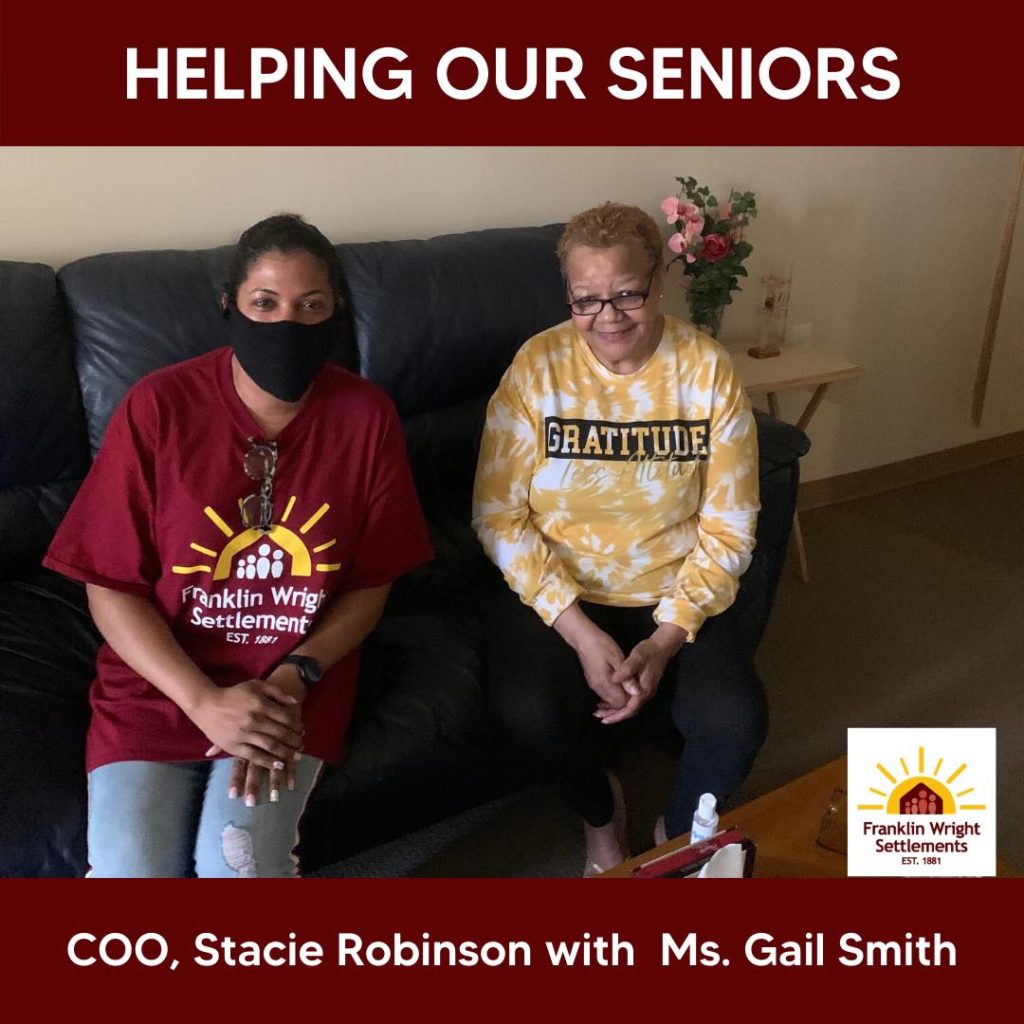Committed to service: Franklin-Wright helps thousands a month with United Way and BET grant funds
Published on September 30, 2020 in Crisis Relief
Gail Smith’s eyes swell with tears as she opens her apartment door and glances down at the box of oranges, vegetables, and dry goods placed before her.
The 70-year-old Detroiter can only muster two words, which she then repeats, “Bless this. Bless this.”
Life hasn’t been easy for Gail but it’s getting a little easier since she was introduced to the team at Franklin-Wright Settlements (FWS) – a Detroit neighborhood services organization that has been assisting individuals and families with basic life, family and social needs since 1881. They provide an expansive range of services from early education to senior care and emergency assistance.
FWS is one of nine organizations that received a total of $2.8 million in funding through United Way for Southeastern Michigan following the Saving Our Selves: A BET COVID-19 Relief Effort fundraiser held in April. In partnership with United Ways across the country, the grant funding targets Detroit and other cities where the African American population has been disproportionately impacted by COVID-19.
Across the U.S., African Americans account for 22 percent of COVID-19 deaths despite being only 13 percent of the population, according to the latest CDC data. Of the 7,013 COVID-19 deaths in Michigan as of Sept. 23, 2,539 were Black or African American.

A Franklin-Wright Settlements volunteer loads a box of food into a car.
More funding, more possibilities
“We jumped for joy. We screamed. We cried,” said FWS CEO Monique Marks reflecting on the funding announcement. “We knew the impact and the difference those dollars would make in the lives of the people who depend on our services.”
Additional BET grant funding was awarded to FWS in September.
“Throughout this crisis, Franklin Wright Settlements has demonstrated a strong ability to quickly get resources into the hands of people who need it most,” said Megan Thibos, director, Economic Mobility Initiatives at United Way for Southeastern Michigan. “When United Way received additional donations through BET for COVID-19 relief, we felt confident in making an additional award to Franklin Wright.”
Megan said the need remains great but organizations like Franklin Wright are making a big difference on the front lines with essential food, health care, and needed technology so that school-aged children can participate in virtual learning.
As of the end of September, United Way’s COVID-19 Community Response Fund had distributed more than $25 million in funding to nearly 700 organizations, thanks to the support of our donors, corporate and foundation partners, and partnerships like the one with BET. Along with the BET funding, millions more have been focused on serving communities of color and immigrant populations.

With funding from United Way and BET, Franklin-Wright Settlements supports more than 3,000 individuals and families each month with food distribution.
Serving seniors
FWS typically serves 5,000 individuals each month – an average of 570 people each day, including many of the community’s most vulnerable seniors. Since the onset of the pandemic, that number has nearly doubled and continues to grow.
The grant funding has allowed the organization to meet the evolving needs of the community by serving more seniors in their homes and adding an emergency hotline that is staffed 24 hours per day, 7 days a week.
Gail reached out to FWS for food assistance after being homebound and eating only peanut butter and jelly crackers for two months during the height of the pandemic.
“It is hard for seniors,” she said. “People just don’t realize that.”

More than food, a family
During Gail’s initial call to FWS, she was connected to COO Stacie Robinson who she had an instant connection with and now refers to as her “adopted daughter.”
“She called on a Tuesday and we usually give out food on Monday, but I knew right then we had to get her a box of healthy food,” Stacie said.
Gail speaks excitedly about the box of broccoli florets and chicken breasts she received. “It’s been such a blessing,” she said.
The two now talk multiple times a week and Gail is looking forward to participating in the organization’s Food and Fellowship senior outings, which they will be able to continue with social distancing and safety measures in place thanks to the BET grant funding.
Recently, FWS began hosting outdoor movies complete with food, beverages and snacks. “We’ve been able to do a ton of things virtually,” Stacie said. “It helps people stay connected, which is really important during this time.”
Alleviating anxiety
Many seniors faced increased anxiety and fear as the pandemic took hold and routines were interrupted, Monique said.
In addition to in-home visits, FWS has a team that makes daily calls to seniors to ensure their basic needs are met and talk through any concerns.
“The impact of coronavirus on the Black community is more than physical, it’s mental,” Monique said. “Everyone knows someone who has been lost to this virus. There are massive numbers of people dying in our community so it’s important for us to address those issues of grief, loss and trauma.”
She added that COVID-19 has fundamentally changed the way the community grieves.
“Not only are people losing their loved ones, they’re not even able to come together and grieve during funerals and repasses. Those are very important celebrations of life for us,” she said.
Monique and her team hold weekly Zoom calls with families who are struggling with the aftermath of COVID-19.
Open to serve
As a dedicated first response location that works with FEMA and houses families during natural disasters, FWS is used to helping people cope with extreme situations. But COVID-19 was different.
“At first, things were very difficult on the community but also on our staff,” Monique said. She recalls telling the organization’s 150 staff members they were going to have to shut down.
“They refused to not come to work because they know how much people depend on us,” she said.
FWS remained open – offering child care services for essential workers and passing out an average of 400 boxes of free food weekly. Grant funds allowed the organization to purchase face masks, cleaning supplies and more personal protection equipment to comply with CDC guidelines and keep everyone safe.
Brighter days ahead
Andrea Rosales, a pregnant mother of five, received one of the boxes after using her last bit of gas to go to another location that was out of food.
“Thank God you guys are here,” she said with her daughter smiling in the passenger seat. When FWS staff members heard her story, they began handing her money from their own pockets. Through tears, Andrea said, “There are still good people in the world.”
Good people are what the FWS team prides itself on being.
They’re looking forward to welcoming seniors back inside their facility when it’s safe and will soon reopen their childcare facility to the public.
In the meantime, they’re helping meet the needs of students learning from home by offering virtual after school programs, supplemental education activities, and more.
“Our job is to help remove any and all barriers wherever they are,” Monique said. “We’re thankful to BET for helping us with that and recognizing us even though we’re not a big national brand.”
To learn more about how United Way for Southeastern Michigan is helping our region recover from the impact of the COVID-19 pandemic, click here.